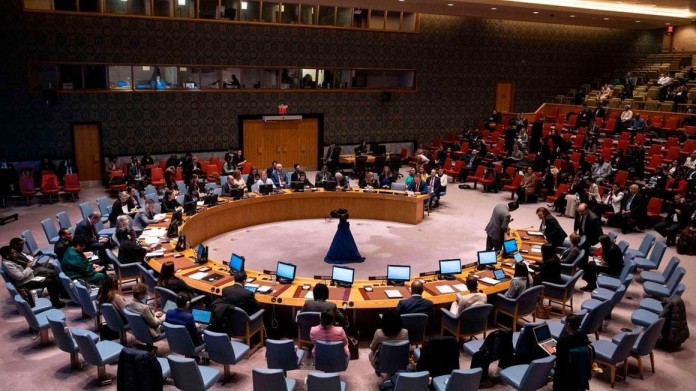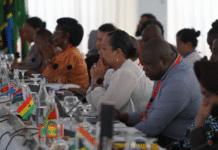By Amin Kef (Ranger)
On 6 June 2023, the General Assembly elected five non-permanent members to the Security Council for a two-year term, beginning on 1 January 2024. The five non-permanent members are Algeria, Guyana, Republic of Korea, Sierra Leone and Slovenia, now considered as the newly elected #UNSC members for 2024-2025.
It will go down the annals of history as the small West African country that succeeded in its bid to fill a vacant position in the non-permanent member category of the 15-Member Security Council.
In May 2022, Sierra Leone launched its bid for the UNSC seat to lobby regional powers for support but Nigeria, which had expressed interest in the seat, dropped out with the mediation of the West African bloc, ECOWAS.
With the passage of time, Sierra Leone later received the African Union’s endorsement at its 39th Ordinary Session of Heads of State and Algeria’s earlier at its 37th session.
Significantly , it must be underscored that Sierra Leone served in the UNSC once, from 1970 to 1971, since it joined the UN in 1961.
The United Nations Security Council, one of six organs of the UN, has the most significant task of maintaining international peace and security.
Only five countries – China, France, Russia, the United Kingdom and the United States – have permanent status in the Council and are collectively known as the P5 with each wielding the power to veto a resolution.
The remaining 10 members are elected to serve on a rotational two-year, non-consecutive term without veto power and the seats in the non-permanent category are allocated per region. Africa has three, which Kenya, Ghana and Gabon were occupying.
In the election that was conducted yesterday, 6th June,2023 , however, only the two seats occupied by Ghana and Gabon were up for replacement.
Other countries elected on the same day were Belarus, Guyana, the Republic of Korea and Slovenia.
Sierra Leone is now among the countries representing Africa on the UN’s most powerful organ.
Sierra Leone currently chairs the African Union’s Committee of Ten (C-10), which is charged with negotiating the continent’s position on the reform of the UNSC. Other committee members are Kenya, Equatorial Guinea, Republic of the Congo, Namibia, Zambia, Libya, Algeria, Senegal and Uganda.
Africa wants to have two permanent representatives in the Security Council and an additional two seats as non-permanent representatives, as enshrined in the Ezulwini Consensus and Sirte Declaration, also called the African Common Position.
The 10 non-permanent members are elected by the General Assembly, which comprises all 193 UN Member States, and in line with geographical distribution by region.
Voting was conducted by secret ballot and candidates must receive a two-thirds majority, or 128 votes, even if they run uncontested.
Overall, 192 countries voted to fill three Council seats allocated to the Africa and Asia-Pacific Groups, and one each for Eastern Europe and Latin America and the Caribbean.
Slovenia beat Belarus in the race for Eastern Europe, receiving 153 votes versus 38, while Algeria, Guyana, Sierra Leone and the Republic of Korea ran unopposed.
The five newly elected countries will join Ecuador, Japan, Malta, Mozambique and Switzerland as non-permanent members of the Council.
They will take up seats currently occupied by Albania, Brazil, Gabon, Ghana and the United Arab Emirates when their terms end on 31 December.
In a tweet, President Julius Maada Bio said: “It is with profound honour and a deep sense of fulfillment to convey the news that #SierraLeone, for the first time in 52 years and for only the second time in our nation’s history, has been elected as a Non-Permanent Member of the United Nations Security Council for the term 2024-2025.
Our candidacy was anchored on the theme of “Partnership, Multilateralism and Representative Approach to Sustained Global Peace and Security” and Sierra Leone was elected by an overwhelming majority of the United Nations General Assembly, running as an endorsed candidate of the @_AfricanUnion.
Our return to the @UN Security Council is a generational accomplishment and a testament to my SLPP Government’s transformation of Sierra Leone’s international reputation and standing and our immense foreign policy gains over the past 5 years.
Our presence on the #UNSC represents our unique success as a democratic and peaceful country of resilience and unbounded optimism; one that successfully transitioned from war to peace while working in partnership with the United Nations. A country no longer defined by the stigma of the past. A beacon of hope and fortitude, a place of great belief that the future will be better, more just and more peaceful because of the investments we are making today in an inclusive and sustainable future.
As Sierra Leone accedes to this primary global decision-making organ on peace and security matters at the United Nations, let me, on behalf of every Sierra Leonean, express our profound gratitude to our #African brothers and sisters and their Governments for their unwavering and unconditional demonstration of solidarity. Sierra Leone’s success is #Africa’s success.
I also thank the member States of the @UN for their overwhelming support and trust in the people and Government of Sierra Leone under my leadership.
On this momentous day, I call on every Sierra Leonean to hold their head high, celebrate, and be proud of Sierra Leone’s historic achievement at the heart of the international system.”




